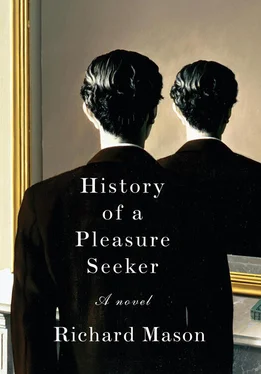In the corner by the window was a desk strewn with invitations. He opened a drawer, discovered a bundle of letters tied with silk ribbon, untied it and read a passionate epistle from a recent suitor whose adoration stretched to fifteen pages. The young man’s sentimentality made Piet smile and remember with pride his own deft handling of Constance. He read a second gushing letter, retied the bundle and returned it. He wanted desperately to see Louisa’s room, over which he had eavesdropped so often; but though the temptation was powerful, it also frightened him, because he was still slightly scared of her.
He went boldly to a small paneled door and opened it. He was right: it led directly to Louisa’s room, which stretched beyond him like a space glimpsed through a looking glass. It was quite unlike Constance’s. There were no pinks, no flowers, no messy piles of clothes. The walls were a pale gray, the bed simple and restrained, with no draperies. The furniture had been made in France in the severe style of the Directory.
He stepped across the threshold. So this was where the girls discussed him. At one end of the room a pair of French windows gave onto the balcony, which overlooked the garden. There were no letters on the desk, or in either of the drawers he opened; no clutter of pillboxes and scent vials on the dressing table. He took a step toward the wardrobe, intent on examining its treasures. But as he moved a shadow loomed beyond the window, dark against the day’s bright light, and before he could hide or retreat the glass door opened and Louisa Vermeulen-Sickerts came in.
The catastrophe was so sudden he marveled later at how deftly he managed it. “I thought you’d missed church,” he said happily. “I’ve been calling for you. I’m desperate for a game of trictrac. Will you join me?”
“In a moment, Mr. Barol.” Louisa went to her desk, with no trace of annoyance. “I’m just about to smoke a cigarette. Don’t tell Papa, will you?” She was wearing jodhpurs and a riding habit that showed off her lean, athletic body.
“I’m an expert keeper of secrets.”
“I’m sure of that.” Louisa took an enameled cigarette case and a box of matches out of a drawer.
Piet lit the cigarette for her. “Do you like to ride?” He had the idea of introducing a compliment.
“Not as much as Mummy and Constance, but I do. Do you?”
“I adore it.”
It was an unwise boast. Piet regretted it the instant he had made it, because there was something dangerous in the way Louisa said: “In that case, we should all go riding one day.” But he hid his nerves and chatted amiably while she smoked, and then they both went down to the summerhouse and played trictrac until lunch.
In their bathroom later that night, when Piet sought counsel over the incident, Didier said: “You’ll have to miss the workers’ fête next week. Pity. The maids are willing and the food’s good. But they keep their horses out there and they’re monsters. Say you’re ill.”
Piet had never ridden a horse in his life but had no intention of passing up the opportunity to inspect Willemshoven or to enjoy the annual fête champêtre Maarten put on for his Dutch workers. He thought of the docile horses owned by the farmers of Leiden. It could not be so very hard to manage on one of them. “I’ll be all right,” he said.
On the floor below, Constance was saying, “Of course he can ride. I thought you liked him now.”
“He’s amusing company, but I tell you he’s lying. I suspect he lies about many things.”
“It’s not fair to give him your horse, if that’s what you really think. Aristotle’s a beast.”
Louisa smiled. “We’ll give him Mummy’s.”
“I still maintain he’s told the truth.”
“We shall see.”
Piet’s judges did not have long to wait. The following Saturday, Didier’s father appeared after breakfast in the white-and-green livery of the Amstel Hotel and drove Piet and the girls in the Vermeulen-Sickerts’ second Rolls-Royce, while Mr. Blok took charge of the first. It was a perfect day for a party and as they left the city Piet’s spirits soared. He had never been in an automobile before. It was a wonderful thing to be driven at twenty miles an hour, with two sought-after young ladies, to an entertainment given by a very rich man on his country estate. At every village, peasants left their fields to line the road, gawping at the handsome cars and elegant figures who rode in them. Maarten’s workers had preceded them by horse-drawn omnibus. That Piet traveled with the family, as a matter of course, made him feel delightfully superior.
Their destination was achieved by a long, twisting drive through flower-filled woods. “Papa wanted somewhere he could rebuild entirely and make comfortable and modern,” explained Constance, who was embarrassed to have a country place in such a poor state of repair. But Piet Barol was charmed by the ivy-covered façade and the charred, empty rooms behind it, in which wild herbs grew and owls nested. The gardens were laid out in the English style. Behind the house, on a wide smooth lawn that dipped in the distance towards a stream, a marquee and a bandstand had been erected, from which trombones glinted as the musicians tuned.
At the appearance of the Vermeulen-Sickertses, the band struck up the national anthem, and Piet emerged from the car with the dignity of visiting royalty. He was superbly dressed. He had paid an expensive and dexterous tailor to alter a light tweed suit of Maarten’s and it fitted him as if he had been its first owner.
“Come and see the stables.” Louisa slipped her arm through Constance’s. “They’re the only part of the house in working order.”
They walked across the lawn into the shade of the trees. The knowledge that the hotel workers would take him for a guest pleased Piet enormously. He talked so naturally that Constance felt sure her sister was about to be confounded, and was glad. They reached a courtyard and crossed it, interrupted three grooms smoking cigarettes, who scrambled to their feet and bowed. Preceded by them, they moved beneath a great arch into a vast and gloomy barn; and now, for the first time, the enormity of Piet’s boast struck him — because these horses were not at all like the friendly beasts that grazed the fields around Leiden.
“Saddle them for us after lunch,” Louisa told the groom. “Mr. Barol shall have Sultan.”
But Piet was ready for her. “Your father gave me this suit,” he said regretfully. “He’d be offended if I ruined it.”
“Oh, you can change.” Louisa smiled. “Our cousin Jurgens left his riding things when he stayed last year, and we’ve never remembered to send them on. He’s about your size. Bit fatter perhaps. I’ve brought them for you.”
Jacobina Vermeulen-Sickerts, in a white dress by Poiret, did not address a word to her son’s tutor all day. But as she entertained her husband’s guests, aware that many eyes were on her, she found herself seeking him out and rejoicing in his beauty. She remembered last year’s fête very well — it had rained; she had worn a wonderful Worth gown, now completely ruined — but already the woman she had been seemed a different, less vital creature.
Regular pleasure had restored the glow of Jacobina’s youth more effectively than any of the painful treatments her friends endured in fashionable spa towns. She was aware, as she shook hands with her husband’s staff, that she made him proud. This pleased her and made her go out of her way to charm the chambermaids and laundresses, the shriveled little wives of the porters, and to listen to their dull, awestruck conversation as if she had never been more amused by anything in her life.
She had chosen Piet’s suit carefully from among her husband’s cast-offs and was entirely satisfied with the figure he cut. Her eyes kept flitting to him and her mind to the delights of the following Monday afternoon; but after lunch she found that he had disappeared, and this alarmed her. Had he sneaked off with a kitchen maid? The possibility was enraging and she began to roam restlessly between clusters of guests. She was at first relieved to see him walking with her daughters towards the stables, in jodhpurs and a smart riding coat. But when she saw Piet clamber onto her horse she faltered in midsentence. It was clear he had never ridden in his life.
Читать дальше












